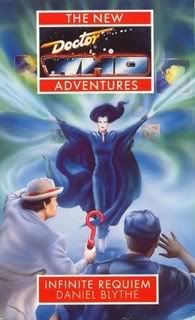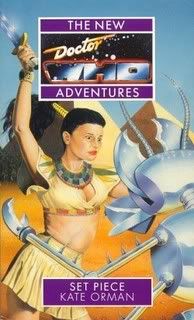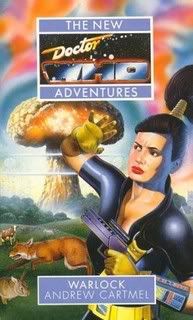 Infinite Requiem By Daniel Blythe
In Brief: In order to ensure the safety of the entire universe, The Doctor and Bernice must combat an all-powerful enemy split across three different points in time & space.
A milk-run really.
Infinite Requiem is a good (but not great) entry into the range of New Adventures. However coming after what has been an excellent yet somewhat heavy run of books lately having something a little bit light-weight isn't a bad change of pace.
However when I say "light-weight" I mainly mean that we've got a mainly straight-forward action story rather than the more psychological terrors of the past few books. In a similar method to his earlier The Dimension Riders Blythe reuses a plot-point from the never-shown serial "Shada" (an enemy who wants to create and control a "universal mind") with some rather neat plotting across multiple times and places. In Infinite Requiem we get the God-like Shanstra, who emerges from the time vortex on a war-torn planet in the 25th-century with one thing (total-control BWAHHAHAH, or something) on her mind. However her influence is felt in 1997 London (where The Doctor and Benny get involved) as well as a Dream-Therapy Centre millennia in the future due to reasons explained in the book.
The book is best in its first half as it draws together what at first seems to be unrelated events as the Doctor and Bernice (both still missing the recently departed Ace. A bit.) investigate. Unfortunately the novel has a slightly poor second half, as the more interesting setting in the modern day is altered to a more futuristic yet blander location. But this isn't to say that any part of the book is bad, it's just mean that the threat of Shanstra's plan feels somewhat lessened as we lose the more "real-life" feeling setting.
This minor problem is made up for though by Blythe being a decent writer with a good grasp of keeping the non-regular characters interesting, even including the alien Phractons (aka Blobs in Floating Balls). The only real disappointment is that the main baddie Shanstra doesn't really develop into more than a cackling "I will rule/destroy you all!" type of villain. However it actually turns out by the end this is somewhat on purpose and actually fits in with how *spoiler* the Doctor eventually defeats her.
But these are all minor complaints in what overall was an enjoyable entry in the book series. It didn't blow my socks off but it did keep me entertained and interested throughout its 200+ pages. There are worse sins than being a bit unmemorable.
Infinite Requiem By Daniel Blythe
In Brief: In order to ensure the safety of the entire universe, The Doctor and Bernice must combat an all-powerful enemy split across three different points in time & space.
A milk-run really.
Infinite Requiem is a good (but not great) entry into the range of New Adventures. However coming after what has been an excellent yet somewhat heavy run of books lately having something a little bit light-weight isn't a bad change of pace.
However when I say "light-weight" I mainly mean that we've got a mainly straight-forward action story rather than the more psychological terrors of the past few books. In a similar method to his earlier The Dimension Riders Blythe reuses a plot-point from the never-shown serial "Shada" (an enemy who wants to create and control a "universal mind") with some rather neat plotting across multiple times and places. In Infinite Requiem we get the God-like Shanstra, who emerges from the time vortex on a war-torn planet in the 25th-century with one thing (total-control BWAHHAHAH, or something) on her mind. However her influence is felt in 1997 London (where The Doctor and Benny get involved) as well as a Dream-Therapy Centre millennia in the future due to reasons explained in the book.
The book is best in its first half as it draws together what at first seems to be unrelated events as the Doctor and Bernice (both still missing the recently departed Ace. A bit.) investigate. Unfortunately the novel has a slightly poor second half, as the more interesting setting in the modern day is altered to a more futuristic yet blander location. But this isn't to say that any part of the book is bad, it's just mean that the threat of Shanstra's plan feels somewhat lessened as we lose the more "real-life" feeling setting.
This minor problem is made up for though by Blythe being a decent writer with a good grasp of keeping the non-regular characters interesting, even including the alien Phractons (aka Blobs in Floating Balls). The only real disappointment is that the main baddie Shanstra doesn't really develop into more than a cackling "I will rule/destroy you all!" type of villain. However it actually turns out by the end this is somewhat on purpose and actually fits in with how *spoiler* the Doctor eventually defeats her.
But these are all minor complaints in what overall was an enjoyable entry in the book series. It didn't blow my socks off but it did keep me entertained and interested throughout its 200+ pages. There are worse sins than being a bit unmemorable.
 Set Piece by Kate Orman
In Brief: The Doctor, Bernice and Ace are scattered throughout history due to a rift in time after a plan goes disastrously wrong. Each thinks the others are dead and try to carry on despite the threat of a living ship filled with giant mechanical ants.
At the end one of them leaves the Tardis for good.
(hint: it's Ace.)
Set Piece would be notable just for the fact that it (finally many would say) sees the permanent departure of the character of Ace from "current" Doctor Who after 8 years (since the character first appeared in "Dragonfire" back in 1987). However it it also turns out to be one of the highlights of the New Adventures. Kate Orman, in her first return to the series since the equally fantastic The Left-Handed Hummingbird, puts together a fantastic story of multiple time-zones and a threat to all of time and space. Set Piece is what the recently televised "A Good Man Goes to Way" *should* have been, with the narrative use of time really having an impact on the characters rather than just being in aid of empty spectacle.
And the return of time-travelling Kadiatu Lethbridge-Stewart from the earlier novel Transit feels like the character of River Song done right.
What made the book really enjoyable for me is how Orman uses what could be a generic sci-fi situation (characters separated through time) but uses it to really dig into how it impacts the series regulars. Orman manages, in the character's last appearance as a regular in the series, to make the fist really successful use of the New version of Ace that we've had through the majority of these books. Gone is the cartoonish "Space Bitch" of earlier novels and instead we get a fully-rounded character that brings the character we first met in 1987 full circle and ready to live on her own.
Although with a portable time-machine to help protect the earth from the rift created by events of the book (and also to allow for occasional guest appearances).
Set Piece by Kate Orman
In Brief: The Doctor, Bernice and Ace are scattered throughout history due to a rift in time after a plan goes disastrously wrong. Each thinks the others are dead and try to carry on despite the threat of a living ship filled with giant mechanical ants.
At the end one of them leaves the Tardis for good.
(hint: it's Ace.)
Set Piece would be notable just for the fact that it (finally many would say) sees the permanent departure of the character of Ace from "current" Doctor Who after 8 years (since the character first appeared in "Dragonfire" back in 1987). However it it also turns out to be one of the highlights of the New Adventures. Kate Orman, in her first return to the series since the equally fantastic The Left-Handed Hummingbird, puts together a fantastic story of multiple time-zones and a threat to all of time and space. Set Piece is what the recently televised "A Good Man Goes to Way" *should* have been, with the narrative use of time really having an impact on the characters rather than just being in aid of empty spectacle.
And the return of time-travelling Kadiatu Lethbridge-Stewart from the earlier novel Transit feels like the character of River Song done right.
What made the book really enjoyable for me is how Orman uses what could be a generic sci-fi situation (characters separated through time) but uses it to really dig into how it impacts the series regulars. Orman manages, in the character's last appearance as a regular in the series, to make the fist really successful use of the New version of Ace that we've had through the majority of these books. Gone is the cartoonish "Space Bitch" of earlier novels and instead we get a fully-rounded character that brings the character we first met in 1987 full circle and ready to live on her own.
Although with a portable time-machine to help protect the earth from the rift created by events of the book (and also to allow for occasional guest appearances).
 Reading Set Piece I was reminded of how Ace was such an important character for Doctor Who once upon a time. Easily the best "companion" of the 1980s (although does she really have competition?) Ace was a huge step forward in terms of quality of character for the show. Although compared to what we get today her stories may seem light on back-story and somewhat clunky (her "seduction" scene in "The Curse of Fenric" defies description) at the time it was a *huge* improvement compared to some of the rather cardboard "shriekers" that had come beforehand. And in some ways Ace is more of a strongly defined character than the likes of Rose, Martha or Amy. I couldn't imagine any of them attacking a Dalek with a baseball bat.
And as a side note one of the things that has irked me about the 2011 series so far is how poorly the characters of Amy and Rory have been realised. They're on the verge of outdoing Mel, Dodo or Peri in terms of being "Generic Companions #1 and #2". While Amy was a bit light on personality last year at least it could be explained away as being due to Steven Moffat's crack. This year it's just feeling lazy.
But despite the importance of the character in the canon of Who having her permanently leave the series was definitely over-due. By 1995 the New Adventures needed to move more away from the TV-show more and stretch the potential for Doctor Who. Set Piece feels like the culmination of the run so far, looking somewhat to the past but getting us ready to enter a fresh phase for the series.
Although still with Dr#7, it's been said that Virgin *wanted* to regenerate The Doctor at the time but weren't allowed by the BBC.
So if you couldn't tell I liked Set Piece a lot, Orman again manages to combine a terrific story with
great writing style and a fantastic grasp of character. Who'd (hah!) have ever thought that a time would come that I'd get more enjoyment out of literary Doctor Who than what was being shown on TV? I say someone needs to head over to Australia and get her writing for the show proper!
But really, sorry to keep harping on about it but this season on TV is feeling rushed and a bit lacking, as if the strain of writing half of the episodes and running the show is proving to be a bit too much for Steven Moffat. TBH I wouldn't mind a bit less of his input.
Reading Set Piece I was reminded of how Ace was such an important character for Doctor Who once upon a time. Easily the best "companion" of the 1980s (although does she really have competition?) Ace was a huge step forward in terms of quality of character for the show. Although compared to what we get today her stories may seem light on back-story and somewhat clunky (her "seduction" scene in "The Curse of Fenric" defies description) at the time it was a *huge* improvement compared to some of the rather cardboard "shriekers" that had come beforehand. And in some ways Ace is more of a strongly defined character than the likes of Rose, Martha or Amy. I couldn't imagine any of them attacking a Dalek with a baseball bat.
And as a side note one of the things that has irked me about the 2011 series so far is how poorly the characters of Amy and Rory have been realised. They're on the verge of outdoing Mel, Dodo or Peri in terms of being "Generic Companions #1 and #2". While Amy was a bit light on personality last year at least it could be explained away as being due to Steven Moffat's crack. This year it's just feeling lazy.
But despite the importance of the character in the canon of Who having her permanently leave the series was definitely over-due. By 1995 the New Adventures needed to move more away from the TV-show more and stretch the potential for Doctor Who. Set Piece feels like the culmination of the run so far, looking somewhat to the past but getting us ready to enter a fresh phase for the series.
Although still with Dr#7, it's been said that Virgin *wanted* to regenerate The Doctor at the time but weren't allowed by the BBC.
So if you couldn't tell I liked Set Piece a lot, Orman again manages to combine a terrific story with
great writing style and a fantastic grasp of character. Who'd (hah!) have ever thought that a time would come that I'd get more enjoyment out of literary Doctor Who than what was being shown on TV? I say someone needs to head over to Australia and get her writing for the show proper!
But really, sorry to keep harping on about it but this season on TV is feeling rushed and a bit lacking, as if the strain of writing half of the episodes and running the show is proving to be a bit too much for Steven Moffat. TBH I wouldn't mind a bit less of his input.
 Warlock by Andrew Cartmel
In Brief: One-Time Doctor Who Script-Editor Andrew Cartmel is back with a tale of the near-future (again), potent hallcinogenic drugs, crime, violence, prostitution and Animal Experimentation.
Things get messy.
Andrew Cartmel has some very strong political opinions.
He really really *really* wants you to know about his political opinions.
And agree with him.
While his earlier Cat's Cradle: Warhead definitely had a certain agenda lurking (not too deeply) under the surface (the horrors of a polluted future, the increasing place of technology in our lives, etc.), he'd managed to keep it for the most part in the sub-text of a very engaging story. Warlock unfortunately puts THE MESSAGE (Animal Experimentation=BAD, Drug Enforcement=BAD, etc.) before givng the reader an interesting and cohesive story.
However I still ended up enjoying the read, despite the sections of the book that get a little nasty in dealing with events involving lab animals (think PETA-pamphlet stuff). Cartmel is good at keeping events moving along, none of it is boring and his prose-style is very accomplished. Unfortunately where he (IMHO) fails is in offering a balanced argument, in particular how every person who works in the Drug Enforcement Agency or animal testing lab are almost cartoonish in their "evil" ethics. There's very little room for moral ambiguity in Cartmeland.
And let's not talk about what happens to Ace's pet cat.
So what is the book about? The main plot is *really* just that there's a drug called Warlock which has the effect of increasing the user's psychic powers and The Doctor wants to know more about it (the whole Lab Experiments thing pops up due to Ace's side-story and actually ends up having no real point in the narrative). There's not much more in terms of plot than that. However that's not really a problem since the author, as with Warhead, keeps the setting and characters (other than the "Bad Guys") interesting. We're back in the Doctor's House on Allen Road, which is a fantastic setting I'd love to see in the show itself (you know, if they ever get back to making stories based about interesting people and places again). The book opens with the regulars having been in the house for a significant amount of time (possibly at least a year, probably recovering from the events in Parasite.) so there's an interesting sense that they really have some "normal" days in between adventures.
Also, Cartmel is really a good author for Ace, probably since he was so involved in the character's creation back in the late 80s. Rather than the OTT Space-Bitch we've gotten on occasion the reader gets the sense that this could well be an older version of the TV-character. Also, the main non-regular characters are given depth which sometimes can be lacking in some lesser New Adventures. It may seem a silly thing to point out, but a few authors have seemed to forget that in a novel it's important to have interesting characters, not just continuous action and continuity references.
So, while not as good as Warhead (which I still think as one of the best of the series, despite the now very dated early-90s view of the future), I found Warlock to be another good book in the series, although the issue of the heavy-handed politics and lack of strong narrative do get in the way. And it's not that I really disagree with all of his political opinions, it's just that I don't like having them screamed at me.
Warlock by Andrew Cartmel
In Brief: One-Time Doctor Who Script-Editor Andrew Cartmel is back with a tale of the near-future (again), potent hallcinogenic drugs, crime, violence, prostitution and Animal Experimentation.
Things get messy.
Andrew Cartmel has some very strong political opinions.
He really really *really* wants you to know about his political opinions.
And agree with him.
While his earlier Cat's Cradle: Warhead definitely had a certain agenda lurking (not too deeply) under the surface (the horrors of a polluted future, the increasing place of technology in our lives, etc.), he'd managed to keep it for the most part in the sub-text of a very engaging story. Warlock unfortunately puts THE MESSAGE (Animal Experimentation=BAD, Drug Enforcement=BAD, etc.) before givng the reader an interesting and cohesive story.
However I still ended up enjoying the read, despite the sections of the book that get a little nasty in dealing with events involving lab animals (think PETA-pamphlet stuff). Cartmel is good at keeping events moving along, none of it is boring and his prose-style is very accomplished. Unfortunately where he (IMHO) fails is in offering a balanced argument, in particular how every person who works in the Drug Enforcement Agency or animal testing lab are almost cartoonish in their "evil" ethics. There's very little room for moral ambiguity in Cartmeland.
And let's not talk about what happens to Ace's pet cat.
So what is the book about? The main plot is *really* just that there's a drug called Warlock which has the effect of increasing the user's psychic powers and The Doctor wants to know more about it (the whole Lab Experiments thing pops up due to Ace's side-story and actually ends up having no real point in the narrative). There's not much more in terms of plot than that. However that's not really a problem since the author, as with Warhead, keeps the setting and characters (other than the "Bad Guys") interesting. We're back in the Doctor's House on Allen Road, which is a fantastic setting I'd love to see in the show itself (you know, if they ever get back to making stories based about interesting people and places again). The book opens with the regulars having been in the house for a significant amount of time (possibly at least a year, probably recovering from the events in Parasite.) so there's an interesting sense that they really have some "normal" days in between adventures.
Also, Cartmel is really a good author for Ace, probably since he was so involved in the character's creation back in the late 80s. Rather than the OTT Space-Bitch we've gotten on occasion the reader gets the sense that this could well be an older version of the TV-character. Also, the main non-regular characters are given depth which sometimes can be lacking in some lesser New Adventures. It may seem a silly thing to point out, but a few authors have seemed to forget that in a novel it's important to have interesting characters, not just continuous action and continuity references.
So, while not as good as Warhead (which I still think as one of the best of the series, despite the now very dated early-90s view of the future), I found Warlock to be another good book in the series, although the issue of the heavy-handed politics and lack of strong narrative do get in the way. And it's not that I really disagree with all of his political opinions, it's just that I don't like having them screamed at me.



